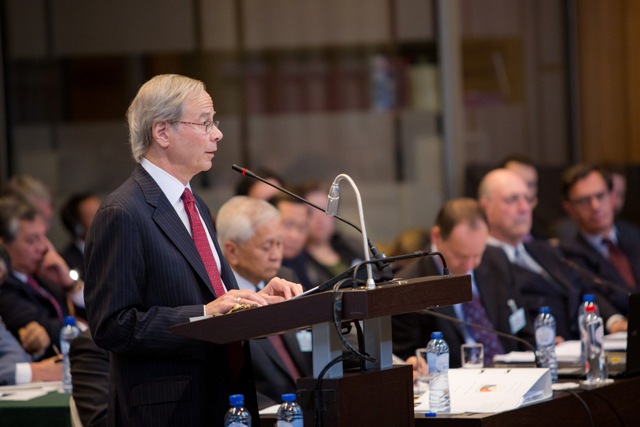
Paul Reichler, the Philippines's lead counsel for its case against China over maritime claims in the South China Sea, speaks before the international tribunal in the Hague in July 2015 for the jurisdictional hearing. PCA / Released
Other nations with expansive maritime claims over remote islets may have to reconsider their position if the international tribunal established under the United Nations Convention on the Law of the Sea (UNCLOS) will rule in favor of Manila in its case against Beijing, an analyst said.
The Philippines in 2013 filed an arbitration case against China before the Permanent Court of Arbitration in The Hague, Netherlands to challenge the latter's claims over the South China Sea. The ruling is expected to be out in May this year.
Academia Sinica research fellow Yann-Huei Song said that the expected favorable ruling for the Philippines may set a precedent that will affect the claims of several nations calling on China to abide by decision.
READ: Obama, SE Asian leaders seek resolution to maritime disputes
"For instance, Australia, Brazil, France, Japan, and the United States all make expansive maritime claims from remote islets that are not dissimilar in size or habitability to some of the Spratly Islands that the Philippines insists are legally rocks, not islands," Song said in an article published in the Asia Maritime Transparency Initiative.
Song explained that all states with the similar claims may face pressure to abide by the precedent set if the tribunal rules that the features in the disputed sea are rocks and cannot generate a 200-nautical mile exclusive economic zone (EEZ) or continental shelf as stated in accordance with the Article 121 of UNCLOS.
"That means that McDonald Island (Australia), Clipperton Island (France), Saint Peter and Paul Rocks (Brazil), Okinotorishima (Japan), and Howland Island, Baker Island, and Kingman Reef (the United States) should generate only 12-nautical-mile territorial seas, not EEZs or continental shelves as their owners currently claim," the maritime analyst said.
The expected ruling of the tribunal in connection to the Spratlys, particularly Itu Aba or Taiping Island which are "rocks" under UNCLOS, will affect the claims of the US.
Howland Island, Baker Island and Kingman Reef in the Pacific Ocean contain no fresh water, no agricultural soil and no permanent population. Under Article 121 of the UNCLOS, they they are not able to "sustain human habitation" or "economic life."
During its 1986 annual meeting of the Law of the Sea Institute in Miami, Florida, the US government stressed its claim to an EEZ around all its possessions, inhabited or not, without regard to size or location.
"The United States had concluded that all islands should have the same capacity to generate EEZs, whether they are inhabited or not, and that isolated or awkwardly located islands should not be viewed as 'special circumstances' or geographical anomalies in determining extended maritime boundaries," State Department assistant legal adviser for oceans, international environmental, and scientific affairs David Colson said.
Professor Jon Van Dyke said that the US position seeks to expand the areas of the ocean claimed by one nation to the exclusion of others. This position reduces the resources shared as "common heritage" for all humankind.
Song noted that the US will have to change or abandon its claim to 200 EEZs and continental shelves in its remote Pacific islands.
Other states with similar claims, including Australia and Japan, should also consider the tribunal's decision and adjust their maritime claims to conform with UNCLOS, Song concluded.
http://www.philstar.com/headlines/2016/03/25/1566291/analyst-manila-vs-beijing-ruling-affect-nations-similar-claims

No comments:
Post a Comment
Note: Only a member of this blog may post a comment.